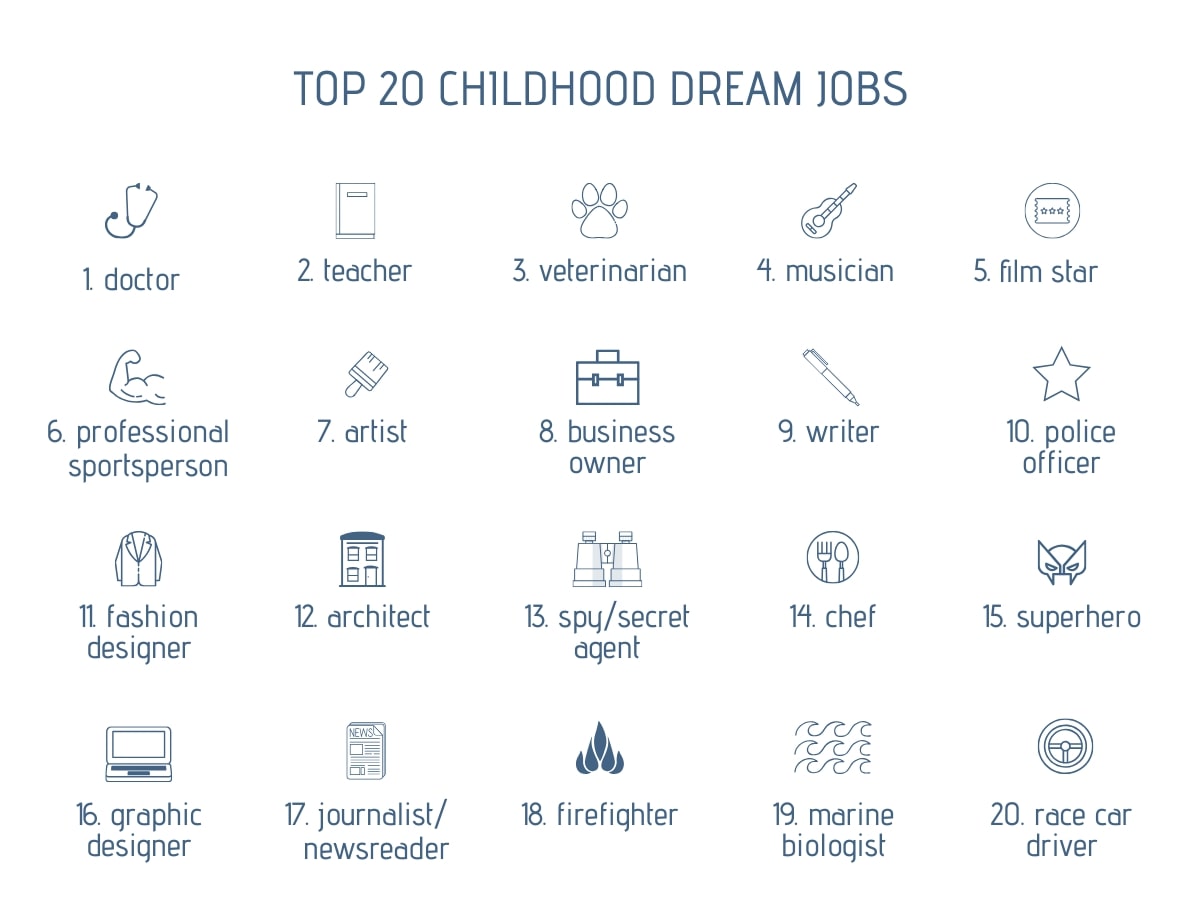Childhood Dream Jobs Study [2021]
Create your CV nowAstronaut. Vet. Footballer. Pop star. When we were kids, the sky wasn’t the limit—it was just the start. Everyone had a childhood dream job. That one role we were convinced we’d grow into. Whether it involved a lab coat, spaceships, or a microphone, our early career aspirations were bold, imaginative, and wonderfully unfiltered.
But how many of us actually followed through? Did childhood dreams become adult careers—or did reality write a different story? According to new research, more than 6 in 10 people did not achieve their childhood dreams. If you want to learn more, read on.
Unfulfilled Promises of Yesteryear
In a US-based survey of 2,000 adults, respondents were asked to reflect on their childhood dream jobs and how those ambitions evolved—or vanished—as they grew older.
The results revealed a rather bittersweet truth: 67% of people did not achieve the job they once dreamed of as children. Even more telling, 58% of those respondents still wish they could turn those early dreams into reality. So, what got in the way?
For many, growing up meant getting realistic. The most common reason given was that respondents simply “became more realistic” in their career expectations. One participant summed it up perfectly:
“I chose to work in a career that was readily accessible instead of idealised jobs, taking a practical approach to available employment—which I usually learned to love or leave.”
Others were forced to change direction due to external circumstances. One respondent shared:
“I couldn’t teach, since there were no available jobs in 1970. I became a nurse instead, where I teach my patients and their families every day.”
Some faced the economic limitations of their dream profession:
“I realised that the job I dreamed of as a child had low pay and minimal opportunities for advancement. I pivoted to law and am probably better for it.”
There were also those who got a taste of their childhood dream—only to find the reality didn’t live up to the fantasy:
“My childhood dream job was to be a veterinarian. I worked for one for a year and had several experiences that showed me I couldn’t mentally handle the harder parts of the job.”
Others became disillusioned with the profession itself:
“I wanted to be a lawyer, so I got to know more about the legal system. I realised how dirty and corrupt it is, and I didn’t want any part of it.”
Perhaps most strikingly, 82% of those who didn’t achieve their dream job are no longer pursuing it at all. But not every story ended in disappointment. A few respondents did, in fact, live out their childhood ambitions. One participant shared:
“I became a professional ballerina who also acted part-time. Now I mostly act, sing, and still dance—but mostly teach ballet. That dream is still alive and kicking!”
These stories show how career paths shift with time, practicality, and personal growth, but also highlight that for a lucky few, childhood aspirations really do come true.

For most people, the shift from “I want to be a superhero” to “I need to get a job” happened surprisingly early—around the age of 15. That’s when many respondents got their first taste of working life through part-time jobs.
For boys, the most common first paid role was mowing lawns (15%), while girls most often took on babysitting gigs (25%). The reality of full-time adult work set in a few years later. On average, people reported starting their first proper job at age 20, with the most popular entry-level industries being catering (15%) and retail (13%).
That early exposure to working life often reshaped their dreams—or pushed them toward more practical career paths.
What Did You Want to Be When You Grew Up?
So, what were the most common childhood dream jobs? You might expect footballer or astronaut to top the list—but the clear winner was doctor. In fact, 6 in 10 children once dreamed of putting on a white coat.
Other popular childhood career goals included the following professions: teacher, veterinarian, musician, film star. The full results are as follows:

Interestingly, both men and women shared a strong interest in becoming doctors. It was the second most popular dream job for both sexes, with 15% of men and 17% of women listing it as their top career goal growing up.
But when we zoom in, the top choices diverged slightly. For male respondents, the number one childhood dream was to become a professional sportsperson, with 17% aspiring to compete at the highest level. The other choices included:
TOP 10 Childhood Dream Jobs for Men | |
1. | Professional sportsperson |
2. | Doctor |
3. | Musician |
4. | Police officer |
5. | Business owner |
6. | Superhero |
7. | Teacher |
8. | Film star |
9. | Architect |
10. | Firefighter |
Among female respondents, the leading childhood ambition was to become a teacher, selected by 22% of women in the study. Here are the other top choices:
TOP 10 Childhood Dream Jobs for Women | |
1. | Teacher |
2. | Doctor |
3. | Veterinarian |
4. | Film star |
5. | Writer |
6. | Artist |
7. | Fashion designer |
8. | Musician |
9. | Business owner |
10. | Chef |
The Best of the Rest
But that’s not all, our respondents pointed out some other incredible dream jobs. In no particular order here are a few of the other jobs that sprang from our respondents’ childhood dreams.
First some typical jobs kids love:
- Astronaut
- Ballerina
- Pilot
- Lorry driver
- Acrobat
And here are some of the more unique responses:
- Trade show coordinator
- Office secretary for upper management
- Electronics engineer
- Entomologist
- System analyst working in the aerospace industry
It just goes to show—some kids dream big, and others dream niche.
What Went Wrong and How to Make it Right
Of course, not everyone ends up becoming a doctor or professional athlete. But what exactly steered people away from their childhood dream jobs, and how prepared did they feel when it was time to step into the job market?
As part of the survey, respondents were asked to imagine applying for a job today using their very first CV. The results were telling: 44% believed they wouldn’t land a well-paid job with that original document. No surprise there. First CVs are often written with little experience and even less confidence.
When writing their first CVs, 27% turned to their parents for help, while 18% asked a teacher or professor. Despite those efforts, nearly 40% now admit they’re embarrassed by that first attempt.
Have those CV-writing skills improved over time? It’s a mixed picture. Nearly half of respondents have updated their CV within the last two years, but one in four haven’t touched it in over a decade. That's a worrying gap in the ever-changing job market.
When asked to rate their confidence in their current CV, the average score was 6.5 out of 10, suggesting many people still feel unsure about how well they’re presenting themselves to employers.
Whether you're chasing your childhood dream job or navigating a career change, one thing is clear: a well-crafted, tailored CV remains your most essential tool for opening new doors.
Key Takeaways
Let’s recap the main findings from this new research:
- Over 6 in 10 people didn’t achieve their childhood dream jobs.
- 6 in 10 people wanted to be a doctor when they grew up.
- 27% of participants turned to their parents for help when writing their first-ever CV.
- On average, respondents rated their confidence in their CV at 6.5 out of 10.
About Us
Apply with Zety and land the dream job. Try our online CV builder, get inspired by great CV examples, learn how to create a CV that will beat the competition, and match it with a compelling cover letter made with our cover letter generator.
About Zety’s Editorial Process
Our editorial team has thoroughly reviewed this article to ensure it follows Zety’s editorial guidelines. Our dedication lies in sharing our expertise and providing you with actionable career advice that offers you real value. Every year, the quality of our content attracts 40 million readers to our site. But that’s not all – we conduct original research to gain a detailed understanding of the labour market. We take pride in being cited by top universities and leading media outlets in the UK and worldwide.



